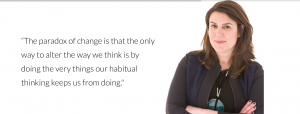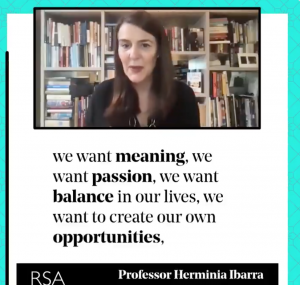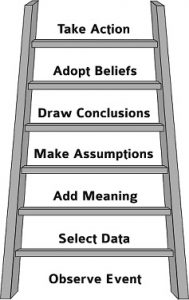Find and share the latest thinking and resources on leadership topics. From quick thought-provoking posts to recommended articles and books, you’ll find a treasure-trove of curated content.
Herminia Ibarra on Career Reinvention – Post Pandemic
We featured author Herminia Ibarra on our executive leadership podcast, WiseTalk just before the release of her book Act Like a Leader, Think Like a Leader. The intelligent, insightful discussion (see recap and link to recording below) covered topics including the outsight principle, how behavior drives attitudes (as opposed to the other way around), and why people fall into the authenticity trap – and how to get out.
As a recognized authority on leadership and career development, we were curious to learn how Herminia is coaching leaders in today’s strange corporate climate.
Here’s what we learned – At the start of the Covid-19 lockdown, as early as April 2020, Herminia Ibarra was quick to consider and share the effects the pandemic and its newly created challenges might have on the workforce. As a twenty-year scholar of career change studying periods including the dot-com boom and bust, the 2008 financial crisis, and the subsequently extended bull-market run, she is all too familiar with unexpected, even catastrophic change on company leaders, employees, and culture.
In an article for Harvard Business Review titled Reinventing Your Career in the Time of Coronavirus dated April 2020, Herminia states,
Unexpected events or shocks disrupt our habitual routines, jolt us out of our comfort zones, and lead us to ask big questions about what matters and what is worth doing. It’s no wonder, then, that during the current pandemic, many people are rethinking their careers.
Today, more than ever, the path to your next career will be circuitous. To cover all of the ground you’ll need to cover, it’s vital to let yourself imagine a divergent set of possible selves and futures. Embrace that process and explore as many of them as you can.
At that time, among her recommendations was to welcome the downtime. She urged people to get involved in projects, take courses, cultivate new knowledge, skills and relationships, do pro bono work, investigate start-up ideas, etc, until they can achieve a state of confidence or better footing.
Lockdown imposed limitations but, the concept was, as is in line with Act Like a Leader, Think Like a Leader, that the time could be an opportunity to learn about yourself and the kinds of contexts and people that bring out the best in you.
Now that we have traveled through these strange months and are emerging back into the world and some semblance of normalcy – Herminia considers lessons learned by the upheaval and the downtime as they relate to career and reinvention. She shares in a recent interview with RSA events, called Precarious Reinvention Through Precarious Times that, while there were rumblings of career change before the pandemic, since Covid those thoughts have been exasperated. The downtime activities and reflection she refers to in April of 2020 are now percolating ideas and actions for change. What is now occurring is a deep dig into what people really want in their careers. People can typically talk about what they do not want in a job. But identifying needs and desires is harder.
The pandemic caused a shock to the system that opened a window for consideration and contemplation. People merely dreaming about a job with more substance, meaning, passion, balance, and control became jolted into a new reality. Mortality entered the equation. Whether their health was in question or they experienced fatal or near-fatal events with friends, family, or colleagues, the question – Is what I am doing worth it? – And so now the real change begins. And, if you did not take the time early in isolation to practice self-reflection, skills building, or experience experimentation, it may be the time to do that now.
Our WiseTalk discussion between Sue and Herminia provides profound insights into how leaders and employees can come to purpose, understand and overcome the common traps that get in the way of stepping up to bigger or different positions or careers. You’ll learn how change really works when we are attempting to grow professionally, and how applying the “outsight” principle reshapes our image of ourselves, our jobs, and our potential. You can listen here.
In case you don’t know Herminia, she is the Charles Handy Professor of Organizational Behavior at London Business School. Before joining LBS, she served on the INSEAD and Harvard Business School faculties. Herminia was ranked 18th among the top management thinkers in the world by Thinkers 50 in 2019. She is a member of the World Economic Forum’s Expert Network, a judge for the Financial Times/McKinsey Business Book of the Year Award, and one of Apolitical’s 100 most influential people in gender policy.
____
WiseTalk recap:
Favorite Quote:
“Until you can feel it in your bones, it’s very hard to have thinking drive your behavior.”
Insights:
- The “outsight” principle means learning by going outside the norm. It’s an external perspective that you get from doing new things and experimenting, by interacting with new people, going outside your past experience, outside your usual network of contacts, and getting a more external perspective to open your eyes to a different reality.
- Traditional leadership development methods tend to emphasize learning through introspection, which is the opposite of the outsight principle. Sue inquired about this juxtaposition. While there is a place for introspection in developing leaders, Herminia’s research showed that behavior drives attitudes and thought processes as opposed to another way around, particularly when the end state is unclear. When transitioning from A to B, and B as the end state is known, it’s easier to plan the steps to get to B. But when the end state is unknown or murky, all the thinking in the world is theory and likely to not match reality. When transitioning to a leadership role for the first time, Herminia explains the only way to aspire to that goal in a way that’s motivating, is to get closer to it through experimentation. Only then will you have fresh material for reflection afterward.
- To gain outsight, Herminia suggested three areas for aspiring leaders to create some experiments: redefining your job, extending your network away from the usual suspects, and being more playful with yourself. Getting started with experiments in these three areas, especially with job activities and network building, will help you gain positive momentum. The people you meet along the way make a huge difference because they become kindred spirits or people who can guide you or you can bounce ideas off of because they are going through something similar. The more time spent thinking about it and conceptualizing this concept, the slower the learnings will come. But those who take action even if they aren’t sure where they are going, or because it feels unnatural, will learn more quickly.
What we found most interesting:
As people try to step up to leadership, they sometimes experience the authenticity trap. Things that don’t feel comfortable for people tend to feel inauthentic. But Herminia explained authenticity can be a defense against learning and a defense against getting out of your comfort zone. Authenticity can be defined in a number of ways, but when people hide behind it they tend to mean, “being as I’ve always been.” Which is not great, because you can be authentic and change a lot. She says, “The way you actually become really authentic is by changing and adapting and by doing so, mean you remain true to yourself in an evolving way…we all want to be ourselves at work but we want to be ourselves in a way that takes into account growth and evolution.”
___
Join us on WiseTalk for inspiring conversation and practical insights when Founder/CEO Susan Bethanis speaks to thought leaders in leadership, tech, design thinking, and human resources.
MORE




